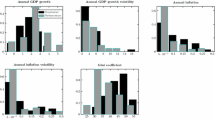Abstract
Using data on members on the Council of Economic Advisors as well as US Treasury secretaries and OMB directors from 1952 through 2005, I investigate the effect of economic advisors’ educational and employment backgrounds on the time series performance of several policy variables. Ivy League advisors appear to raise non-defense government spending, although the size of the impact differs by president. While voter preferences appear to matter for a wider variety of policy variables (changes in federal regulation and marginal tax rates), the share of Ivy League advisors is at least as important as voter preferences in explaining non-defense spending.
Similar content being viewed by others
References
Alonso, R., & Matouschek, N. (2008). Optimal delegation. Review of Economic Studies, 75(1), 259–293.
Blankart, C. B. (1981). Towards an economic theory of advice and its application to the deregulation issue. Kyklos, 34(1), 95–105.
Colander, D. C., & Coats, A. W. (Eds.) (1989). The spread of economic ideas. Cambridge: Cambridge University Press.
Faulhaber, G. R., & Baumol, W. (1988). Economists as innovators. Journal of Economic Literature, 26(2), 577–600.
Feldstein, M. (1997). The Council of Economic Advisers: From stabilization to resource allocation. American Economic Review, 87(2), 99–106.
Frey, B. S. (2006). How influential is economics? De Economist, 154(2), 295–311.
Frey, B. S., Pommerehne, W. W., Schneider, F., & Gilbert, G. (1984). Consensus and dissension among economists: An empirical inquiry. American Economic Review, 74(5), 986–994.
Friedman, M. (1986). Economists and economic policy. Economic Inquiry, 14(1), 1–10.
Fuchs, V., Krueger, A. B., & Poterba, J. M. (1998). Economists’ views about parameters, values, and policy: Survey results in labor and public economics. Journal of Economic Literature, 36(3), 1387–1425.
Groseclose, T. J., Levitt, S. D., & Snyder, J. M. (1999). Comparing interest group scores across time and chambers: Adjusted ADA scores for the U.S. Congress. American Political Science Review, 93(1), 33–50.
Goff, B. L. (1996). Regulation and macroeconomic performance. Boston: Kluwer.
Goff, B. L. (2005). From the ballfield to the boardroom: Management lessons from sports. Westport: Praeger.
Goff, B. L., McCormick, R. E., & Tollison, R. D. (2002). Racial integration as an innovation: Evidence from basketball and baseball. American Economic Review, 92(1), 16–26.
Holmström, B. R. (1984). On the theory of delegation. In M. Boyer & R. E. Kihlstrom (Eds.), Bayesian models in economic theory (pp. 115–142). New York: North-Holland.
Jensen, M., & Meckling, W. (1992). Specific and general knowledge, and organizational structure. Journal of Applied Corporate Finance, 8(2), 4–18.
Jensen, M., & Meckling, W. (1994). The nature of man. Journal of Applied Corporate Finance, 7(2), 4–19.
Kirzner, I. M. (1997). Entrepreneurship and the competitive market process: An Austrian approach. Journal of Economic Literature, 35(1), 60–85.
Mayer, T. (2001). The role of ideology in disagreements among economists: A quantitative analysis. Journal of Economic Methodology, 8(2), 253–273.
McKelvey, R. D. (1986). Covering, dominance, and institution-free properties of social choice. American Journal of Political Science, 30, 283–314.
Muris, T. J. (2003). How history informs practice: Understanding the development of U.S. competition policy. American Bar Association Antitrust Section Fall Forum. Retrieved May 10, 2007, from http://www.ftc.gov/speeches/muris.
Nelson, R. H. (1987). The economics profession and the making of public policy. Journal of Economic Literature, 25(1), 49–91.
Peacock, A. T. (1992). The credibility of economic advice to government. Economic Journal, 102(5), 1213–1222.
Reder, M. W. (1999). Economics: The culture of a controversial science. Chicago: University of Chicago Press.
Rivlin, A. (1987). Economics and the political process. American Economic Review, 77(1), 1–10.
Schultze, C. L. (1996). The CEA: An inside voice for mainstream economics. Journal of Economic Perspectives, 10(3), 23–39.
Semenov, A. (2007). Bargaining in the appointment process, constrained delegation, and the political weight of the Senate (Working Paper). National University of Singapore.
Snyder, S. K., & Weingast, B. A. (2000). The American system of shared powers: The president, congress, and the NLRB. Journal of Law, Economics, and Organization, 16(2), 269–305.
Stein, H. (1996). A successful accident: Recollections and speculations about the CEA. Journal of Economic Perspectives, 10(3), 3–21.
Stephan, P. E. (1996). The economics of science. Journal of Economic Literature, 34(3), 1199–1235.
Stigler, G. J. (1982). The economist as preacher and other essays. Chicago: University of Chicago Press.
Stiglitz, J. (1997). Looking out for the national interest: The principles of the Council of Economic Advisers. American Economic Review, 87(2), 109–113.
Wible, J. R. (1998). The economics of science: Methodology and epistemology as if economics really mattered. London: Routledge.
Author information
Authors and Affiliations
Corresponding author
Rights and permissions
About this article
Cite this article
Goff, B. Do differences in presidential economic advisers matter?. Public Choice 142, 279–291 (2010). https://doi.org/10.1007/s11127-009-9549-1
Received:
Accepted:
Published:
Issue Date:
DOI: https://doi.org/10.1007/s11127-009-9549-1




